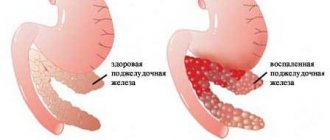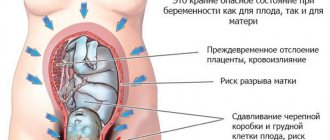About the monthly dynamics of abdominal growth
Of course, it is impossible to judge the size of the abdomen of all pregnant women according to the standards established by medical indicators. Every girl takes a photo of her belly during pregnancy, but only the doctor weighs all the individual characteristics of her body and only then makes a conclusion about the normal development of the fetus or its abnormalities.
To analyze the indicators, the doctor needs to know:
- weight, height of the woman in labor;
- general increase to initial weight;
- woman’s lifestyle (active or passive);
- pregnancy with one fetus or two, three;
- fetal weight;
- what position the fetus took in the uterus;
- how much amniotic fluid is formed;
- The patient is pregnant for the first time or is this her second or third birth.
It is very important not to miss the deadline when you need to register with a gynecologist. To do this, you must contact an antenatal clinic no later than the 12th week of pregnancy.
After each appearance, data on abdominal circumference in early pregnancy, fundal height, and weight will be entered into the patient’s card.
Stomach pain during pregnancy before delay
The causes of this condition can be physiological and pathological processes. A nagging, aching pain, similar in nature to the onset of menstruation, may be associated with the attachment of the embryo to the walls of the uterus. The process of implantation of a fertilized egg may also be accompanied by slight bleeding.
Hormonal changes in the body affect the functioning of the intestines and make it possible to understand by the stomach that pregnancy has occurred. Bloating, constipation, or even inflammation of the intestinal walls can cause pain and be symptoms of successful conception.
Hormonal changes in the body and an increase in blood flow to the pelvis provoke changes in the functioning of internal organs, which can also lead to discomfort in the lower abdomen. There is a transformation in the functioning of the urinary system, causing pain in the ureters or bladder.
Sometimes a condition in which the stomach hurts during pregnancy before a delay can be a sign of a threat of miscarriage. This process is often accompanied by bloody discharge, severe pain in the uterus and lower back. If alarming symptoms appear, a woman should contact a gynecologist to find out the cause of the discomfort.
What you need to know about abdominal pain in a pregnant woman?
The most wonderful feeling a pregnant woman can experience is the movement of her baby. But in addition to small tremors, a woman may experience not entirely pleasant sensations with pulling and stabbing pain. If such symptoms are noticeable in the early stages, then there may be a risk that the pregnancy may be terminated.
If the pain is acute, this may be a signal of an ectopic pregnancy. Due to the enlargement of the uterus, during this period, pain may indicate a sprain of the ligamentous apparatus.
Perhaps your intestines have malfunctioned and this can also cause painful sensations, just as renal colic can be disguised as nagging pain. The diagnosis must be made by a specialist doctor and complex treatment prescribed, if appropriate.
Regarding the question of many women, at what week of pregnancy can the stomach hurt, we clarify that after 22 weeks pain in the abdominal area may appear, but they usually indicate:
- threat of premature birth;
- the scar may have broken apart (after a caesarean section);
- the likelihood that the placenta began to separate prematurely, which is very dangerous for the further development of the fetus;
- that there is a gynecological pathology (cyst, fibroid);
- different types of colic (intestinal, hepatic).
Late pregnant women cannot “pull” their stomach, as this is already a deviation from the norm. A woman should enjoy the baby's kicks, his movements, and short-term tone, after a routine examination by a doctor.
The iliac region can also make itself felt with increasing pain; this may indicate an ectopic pregnancy, or an ovarian cyst or hemorrhage into it.
Statistical pain that stops and then reappears throughout the entire abdomen indicates problems with the intestines. A proper diet, which should consist of balanced food, will help you deal with it. If you are concerned about constipation, then perform a rectal procedure with a glycerin suppository (1 suppository once a day) to sort it out.
To deal with renal colic (stabbing, pain in the abdominal area), you need to accurately determine whether you have such a problem. Observe the color of your urine, which may be dark, brown, or cloudy. If all these symptoms are accompanied by painful urination, then most likely you are dealing with renal colic.
- Pregnancy by week - fetal development, main stages and timing of pregnancy (115 photos)
Medical termination of pregnancy - description, drugs, timing, advantages and disadvantages (115 photos and videos)
Pulling in the stomach during pregnancy: causes, symptoms, pain and possible complications (85 photos and videos)
Why does my stomach change? How to determine this?
Abdominal prolapse is considered one of the harbingers of impending childbirth. Nature is never in a hurry, unlike mommies who want to plan and know everything in advance.
Closer to the 37th week of pregnancy, there comes a period when the mother’s body prepares for the birth of the baby. A special hormone is produced - relaxin. Under its action, the tendons and connective tissues of the pelvic bones soften and they “diverge” a little.
At this stage, the lower part of the uterus increases significantly in size and the baby descends. Now its head is fixed by the pelvic bones, which also contributes to the opening of the uterus.
The baby's entry into this position is often accompanied by pain, which pregnant women, especially those expecting their first child, mistake for contractions. Unlike contractions, this does not last long, and then everything calms down.
And the baby has become quite large and it is difficult for the muscles to hold him in his original position. A drooping belly is one of the first signals for expectant mothers that it is time to prepare for a trip to the maternity hospital.
Not all expectant mothers notice how this happens and are worried that they will miss such an important indicator of an upcoming event. Most likely, changes in the position of the abdomen will be felt by a woman of thin build - dense and physically strong pregnant women do not feel the shifted load too much.
However, there are several ways and visible signs by which changes can be detected:
- One of the simple ways to find out about the “movement” of the tummy is this: make a mark on the door with a marker at the level of your navel; when the stomach drops, the navel will be about 5 cm lower;
- measure the distance between the chest and abdomen - now your palm fits here;
- The gait of the expectant mother changes noticeably - a “proud duck walk,” that is, the pregnant woman “waddles” from one foot to the other, walks with her head held high and her back straight;
- possible weight loss for the expectant mother up to 2-3 kg;
- the shape and appearance of the “belly” itself changes: it becomes hard, drooping and pear-like, stretch marks become more pronounced;
- If previously the pregnant woman looked round from all sides, then after such changes the outline of the waist appears at the back.
Important! If your stomach begins to droop, be sure to tell your doctor. A bag with all the necessary things for the baby and mother should be collected and placed in a visible place. At this point, you must choose a maternity hospital and agree with the doctor. You should not take long walks or go far from home. A pregnant woman should be under the constant supervision of loved ones.








